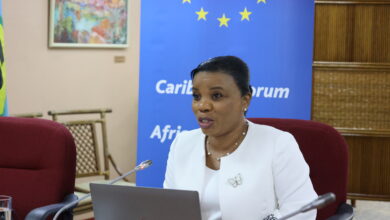INFORMAL PUEBLA MEETING A POSSIBLE ‘LIFE-LINE’ FOR STALLED FTAA TALKS CHRIST CHURCH, BARBADOS – Senior Trade Officials from several Free Trade Area of the Americas (FTAA) countries will gather in Puebla, Mexico Thursday August 25 to discuss future funding arrangements for the Americas-wide trade talks. The informal meeting is being convened by the Government of Mexico, which currently hosts the temporary FTAA Administrative Secretariat located in Puebla City. This is the first time that Senior FTAA Officials will meet, albeit informally, since the adjournment of the Seventeenth Meeting of the Trade Negotiations Committee (TNC) in February 2004. While the meeting will consider pressing administrative and financial matters as they relate to the FTAA Administrative Secretariat, it provides an important opportunity for Senior Trade Officials to assess the possibilities for re-starting the negotiations, which have been stalled for more than eighteen months. Future funding for the Secretariat cannot be discussed in isolation from a frank exchange and realistic assessment of the future of the FTAA process. This initiative by the Mexican Government therefore comes at a critical stage in the hemispheric integration process, and could provide the impetus needed to revive FTAA negotiations. “There should be an informal ‘mini-Senior Officials’ meeting on the margins of the Puebla meeting, to enable a process of reflection and discussion on the possible way forward,” Director General of the Caribbean Regional Negotiating Machinery (RNM) Ambassador Dr. Richard Bernal has suggested. “The interchange should enable officials to: (a) assess the technical and political problems affecting the negotiations; (b) consider the options for resuming the negotiations; and, c) propose a road map for the successful completion of the negotiations”. Given the potential the Puebla meeting holds for discussing issues of process, it would be important that all FTAA countries attend the informal meeting, so that fresh impetus can be given to these long-running talks ahead of the Fifth Summit of the Americas in Argentina in November this year. Lack of Engagement Negotiations for the FTAA, a proposed 34-country hemispheric free trade agreement, broke down in February 2004 following failure by Senior Trade Officials to agree on the scope of obligations to be assumed by all FTAA countries, as well as procedures for the conduct of plurilateral negotiations. Attempts by the US and Brazilian TNC Co-Chairs to revive the talks have been unsuccessful. At the outset of 2005, both Co-Chairs signalled that they were actively exploring ways to re-launch the embattled talks. However, the Co-Chairs have not met in months, initially having cited scheduling problems. Save for repeated statements from certain countries, including CARICOM countries, reaffirming a commitment to the FTAA, there has been a hiatus in the process, with no clear guidance on the way forward. Dynamics far from Propitious for Re-Launch In as much as the Puebla meeting presents an important opportunity for interchange, it takes place at a time when circumstances are far from propitious for a re-launch of negotiations. The FTAA faces several competing agendas both in the hemisphere and globally, which diminish its political and economic priority for several countries in the hemisphere. At the hemispheric level, the US has pushed ahead with separate, faster bilateral trade agreements with several countries involved in the FTAA process. This has prompted a re-evaluation of strategic trade options by various countries in Latin/Central America, as regards utilizing the FTAA as a springboard for securing access to the US market. Waning support for the FTAA has also been evident over the last several months, notwithstanding recent policy pronouncements by the principal players reaffirming continued commitment to the goals of the FTAA. Certain countries have openly suggested that World Trade Organization (WTO) Doha Round negotiations remain their fundamental and main priority, and that the Americas-wide trade pact is “off the agenda”. Recent changes announced at the US Trade Representative’s office, in particular the reassignment of deputy USTR Ambassador Peter Allgeier, the current US TNC Co-Chair in FTAA talks, to the WTO will likely also impact on the FTAA process. Need for Pragmatic Re-dimensioning The successful re-launch of FTAA negotiations requires a pragmatic re-dimensioning of the scope of the trade agreement under negotiation. Consensus on a simpler, more efficacious structure of negotiations is needed, if the completion of the FTAA is not to be jeopardized. This can be achieved by defining the scope of the FTAA as the core issues, which had previously commanded consensus. The subjects, issues and extent of liberalization not in the consensus could be added to the accord, in a subsequent round of negotiations. A unified structure would improve chances for a re-launch of the process of hemispheric trade negotiations; and by removing the most contentious elements from the negotiations thereby enhancing the feasibility of completing them.
News Letter
Subscribe to our mailing list to get the new updates!
Check Also
Close
-
On the HERizon: CARICOM Women shaping STEAM
July 11, 2025




